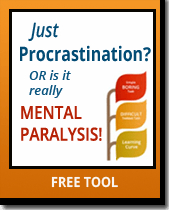
Imposter Syndrome with ADD / ADHD
“I rarely complete a task as well as I wish I had.”
“Sometimes I'm afraid my co-workers will discover how unskilled I actually am.”
Are you constantly questioning your own success or often fear that someone will “find you out”?
If you have ADD / ADHD and you frequently feel this way, you may be experiencing Imposter Syndrome.
Yes, “Imposter Syndrome” is a real thing.
The term “Imposter Syndrome” (or IS) was coined in the ‘70s by psychologists to describe people who feel like a fraud even though they are actually achieving a high level of success.
The syndrome can be high in people with ADD / ADHD because they may already be accustomed to hiding symptoms like impulsive behavior, difficulty sitting still, or having trouble focusing. Therefore, when they achieve much-deserved success, they can fear that someone will discover that they aren’t, in fact, as ‘together’ as they seem.
These anxious thoughts can be overwhelming and can even stand in the way of further professional and personal success.
Leadership blogger Karoline Gore explains:
Signs of Imposter Syndrome
Do any of these sound like you?
- You don't believe your own contribution – If you have Imposter Syndrome, you may not know how to acknowledge your contribution to your company’s success. For instance, you may feel it is all owed to your colleagues, or to a stroke of luck.
- You ruminate about failures – You may spend time dwelling on what you did wrong, rather than on what you did right. You may also compare yourself to others, thinking that they have had to make a much smaller effort to achieve the same results as you.
- You don't trust your success – You may also be unable to celebrate current success, worrying instead about the next deadline or goal and doubting if you will be able to achieve it.
Why you should take Imposter Syndrome seriously
Imposter Syndrome can cause a perpetual state of stress. When you are in constant ‘fight or flight’ mode, it can hamper your ability to focus, as well as affect your memory, mood and cognitive functioning.
If you reach a high level in your company because of your competency or skill, Imposter Syndrome can stop you from stepping up to big goals. You may have a big goal to complete if, for example, your company merges with another and you are called upon to ensure the process runs smoothly.
Therefore, it's key to take this syndrome seriously, seeking help to make sure it doesn't affect your work performance, or even your self-confidence and well-being.
Imposter Syndrome differs in men and women
Research has shown that Imposter Syndrome often affects men and women differently.
When men with IS receive negative feedback from superiors, they tend to react negatively, becoming either argumentative or defensive.
Women, on the other hand, tend to take the criticism to heart and make double the effort.
Both of these types of responses can stand in the way of success – by either diminishing your motivation, or by forcing you to work harder or longer hours than your mental or physical health can cope with.
Treatments for Imposter Syndrome
ADHD Coaching
A Certified ADHD Coach can be key when it comes to helping you reach your full potential. Your ADHD Coach can point out things you may doing that are a result of Imposter Syndrome. For example, if you have perfectionist tendencies, that might include procrastinating because you fear less than perfect results.
A coach can also ensure you have a sound life-work balance by helping you manage your time in how you plan and prioritize.
Finally, an ADHD Coach can show you that instead of feeling ashamed about your achievements, you can learn to embrace them and use them to motivate you to further success.
Cognitive Behavioral Therapy
CBT is another proven method to deliver benefits to adults with ADHD – including a rise in self-confidence, productivity, and emotional well-being. For Imposter Syndrome, CBT can be helpful, illuminating the way that negative thoughts and emotions affect your behavior, and vice-versa. Your therapist will encourage you to keep a diary and make small behavioral changes to see how they affect the way you think or feel about a task, person, or situation.
If you relate to the symptoms of Imposter Syndrome, don’t ignore it. Seek professional help so you can understand how the negative thoughts you're entertaining may be your main obstacle to further success. And learn how to exercise self-compassion for a fuller, happier life.





Andy Conn
I’ve recently found out that I have ADHD. Feeling like a fraud has been normal to me ever since I was young.
Bonnie Mincu
It’s not just us with ADHD that have Imposter Syndrome. It’s pretty common for everyone, even the most successful people. Sometimes faking a feeling of self-confidence is what you need to gain the experience that will give you real confidence in what you’re doing.
That fraud feeling can apply to life skills as well as professional competence. For example, I’ve found it funny that some ADHD people who come across as very organized insist that they’re really not… that they’ve just developed organization skills as “coping mechanisms.” But once they’ve developed a skill and are using it, they ARE organized — even if they weren’t born that way. Those people feel like a fraud when they appear organized, since in their heart they still see themselves as disorganized.